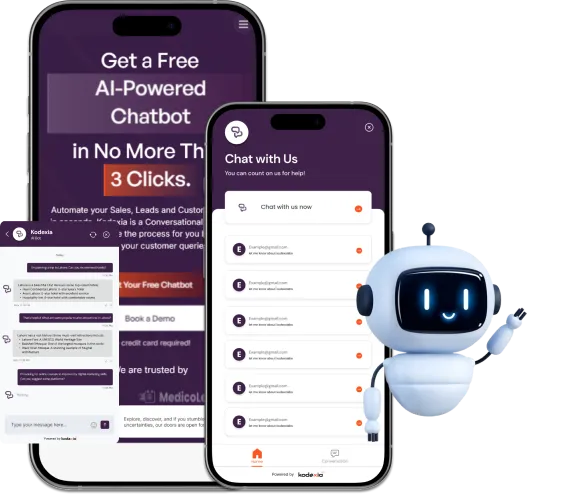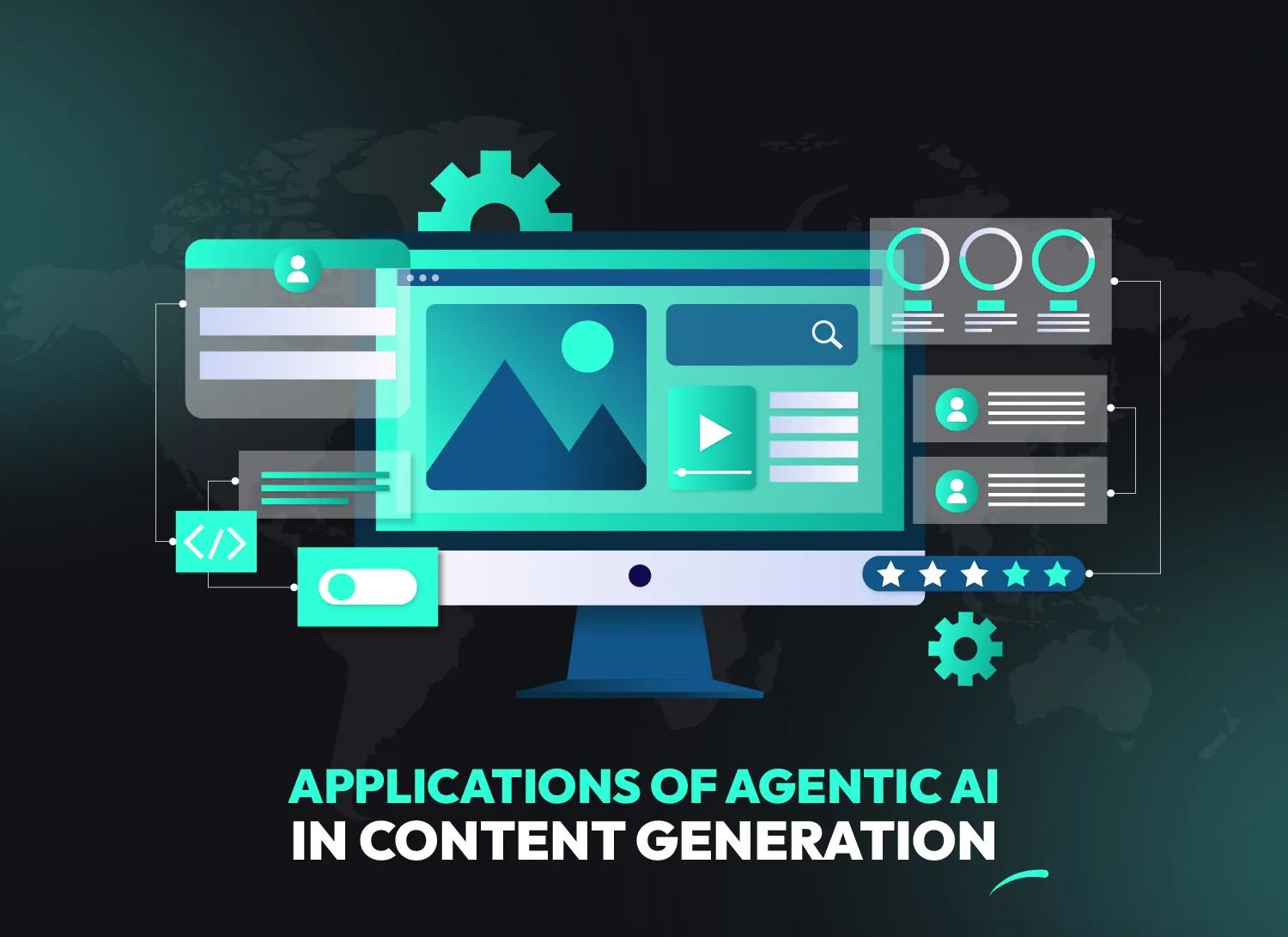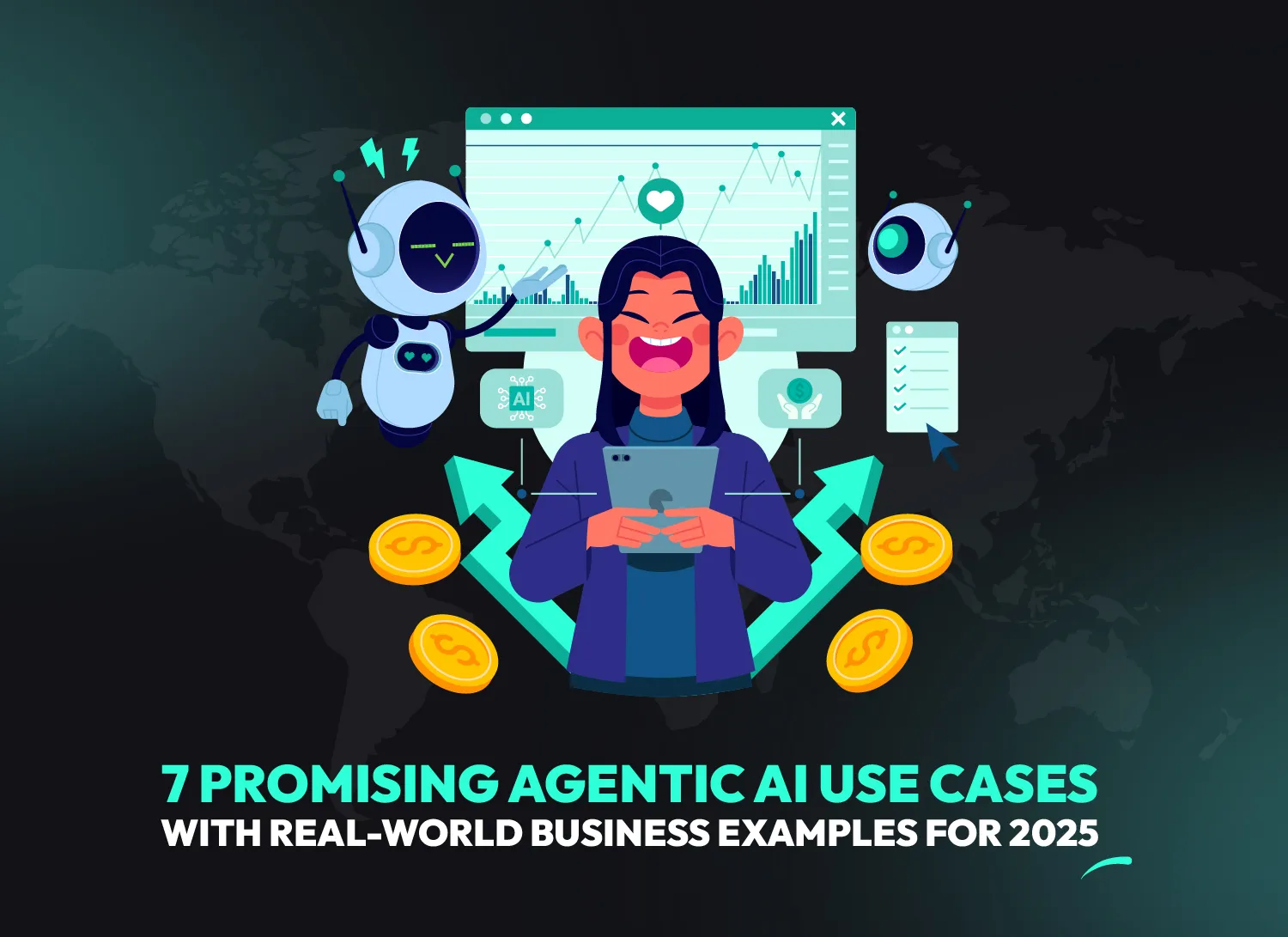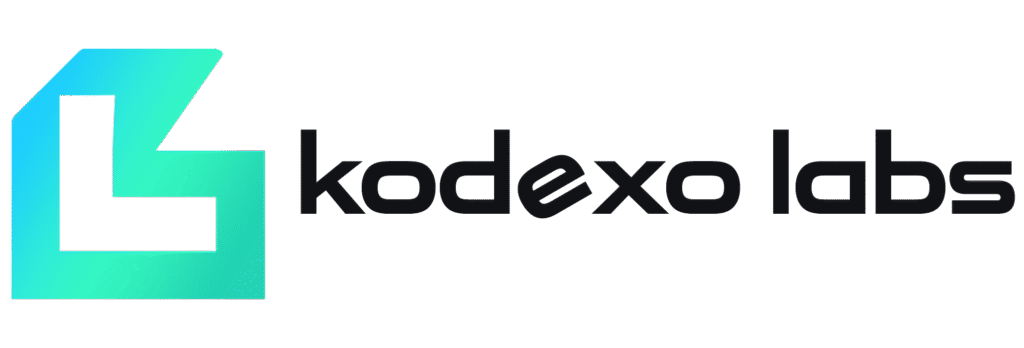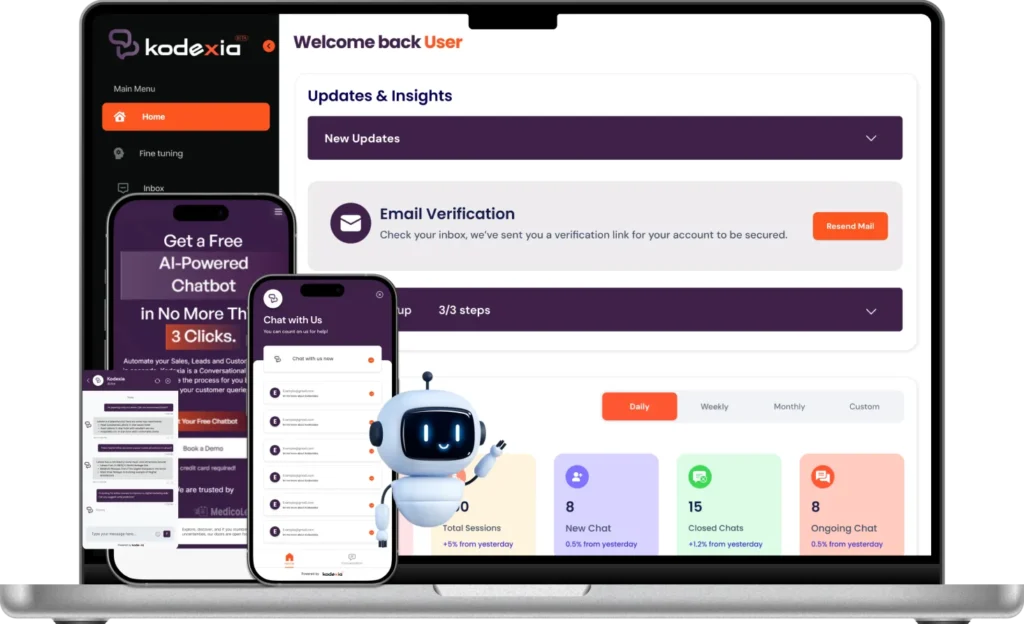AI in Medical Records – AI Paves The Way for a Better Data Handling and Data Management
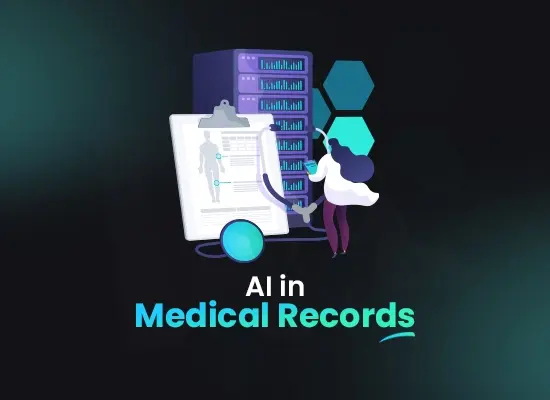
Contents
The vast amount of data within medical records holds immense potential for improving healthcare, but sifting through it can be time-consuming. Artificial intelligence (AI) is revolutionising this field by offering a powerful set of tools to analyse and manage medical records. From summarising complex patient histories to predicting potential health risks, AI is transforming how we store, understand, and utilise medical information.
What is the Role of AI in Medical Records?
Artificial intelligence (AI) is rapidly transforming the healthcare landscape, and its impact is being felt significantly in the realm of medical records. Traditionally, record keeping for medical work has relied on manual data entry and physical storage, making it time-consuming, prone to errors, and challenging to access. AI is revolutionising record keeping for medical work by introducing intelligent automation and advanced data analysis capabilities.

NLP for healthcare: Unlocking the Power of Unstructured Data
One of the key areas where AI shines is in Natural Language Processing (NLP) for records for medical data. NLP allows AI systems to understand and process the vast amount of unstructured data contained within medical notes, radiology reports, and other documents. This data, often filled with medical jargon and complex phrasing, can be difficult for traditional computer systems to interpret. NLP empowers AI to extract critical information from these documents, allowing for an automated population of electronic medical records (EMRs) and improved data quality.
Automated Record Systems: Streamlining Workflows and Boosting Efficiency
AI-powered automation in record systems is streamlining record keeping for medical work workflows and boosting efficiency for healthcare providers. These systems can automate tasks like data entry, coding, and record maintenance. For instance, AI can analyse doctor-patient consultations and automatically populate relevant sections of the EMR, freeing up valuable time for doctors to focus on patient care. Additionally, AI can identify inconsistencies or missing information within records, prompting medical staff for updates and ensuring the accuracy and completeness of medical data.
AI-driven Insights: Proactive Care and Improved Patient Outcomes
Beyond automation, AI unlocks the potential for advanced data analysis within records for medical data. By analysing vast amounts of patient data, AI can identify trends, predict potential health risks, and recommend personalised treatment plans. This allows for proactive care, enabling early intervention and potentially improving patient outcomes. Imagine an AI system analysing a patient’s medical history and flagging them for a higher risk of a certain disease. This prompts the doctor to order targeted tests and potentially detect the disease early on, leading to better treatment options.
The integration of AI in records for medical data is still evolving, but its potential is undeniable. From NLP-powered data extraction to AI-driven insights, development of Artificial Intelligence is transforming record keeping for medical work into a more efficient, accurate, and intelligent system, ultimately paving the way for improved patient care and better health outcomes.
How do Businesses benefit from Record Maintenance?
In today’s data-driven world, businesses across all industries rely on meticulous record maintenance. This is especially true in the healthcare sector, where accurate and detailed medical record keeping is paramount. From patient safety to financial reimbursements, robust record maintenance systems are the backbone of efficient and compliant healthcare delivery.
One of the key benefits of effective record maintenance is ensuring regulatory compliance. Medical institutions are subject to a complex web of regulations, and proper record keeping is essential for demonstrating adherence to these standards. Having well-organised automation in record systems allows for easy retrieval of patient information during audits, reducing the risk of penalties and ensuring patient privacy.
Beyond compliance, efficient record maintenance unlocks a treasure trove of valuable data. By leveraging Natural Language Processing (NLP) for medical records, healthcare providers can glean crucial insights from patient data. NLP can analyse vast amounts of medical information, extracting trends, identifying potential risks, and even predicting future health outcomes. This empowers doctors to make more informed decisions, personalise patient care plans, and ultimately improve the quality of healthcare delivery.
Furthermore, robust record maintenance systems streamline administrative tasks and boost overall operational efficiency. Automated systems eliminate the need for manual data entry, reducing the risk of human error and saving valuable time for healthcare professionals. Additionally, easy access to patient information allows for faster processing of insurance claims and reimbursements, improving cash flow and financial stability for medical institutions.
In conclusion, effective record maintenance is not just a regulatory requirement, but a strategic advantage for businesses in the healthcare sector. By implementing a comprehensive record keeping system, healthcare providers can ensure compliance, leverage data analytics for better decision-making, and improve operational efficiency. Investing in record maintenance ultimately translates to improved patient care, financial well-being, and a competitive edge in the ever-evolving healthcare landscape.
6 Ways CTOs and CEOs Can Incorporate Automated Record System for their Growth:
In today’s data-driven healthcare landscape, efficient record keeping for medical work and maintenance are fundamental for any organisation’s success. Traditional paper-based systems or siloed electronic records are no longer sufficient. This is where automated record systems come in, offering a comprehensive solution for managing records for medical data. By implementing automation in record systems, CTOs and CEOs can unlock a multitude of benefits that propel their business towards growth. Here are six key ways CEOs and CTOs can leverage automation in record systems to achieve significant growth:

1. Enhanced Efficiency and Streamlined Workflows:
Automated record systems eliminate the need for manual data entry, reducing errors and saving valuable time for staff. Automated systems can handle repetitive tasks such as scheduling appointments, generating prescriptions, and managing referrals, freeing up staff to focus on patient care. Additionally, these systems can streamline workflows by integrating seamlessly with various healthcare applications, ensuring a smooth flow of information.
2. Improved Data Accuracy and Accessibility:
Automated record systems ensure that records for medical data are accurate, complete, and up-to-date. This eliminates the risk of errors associated with manual data entry and ensures consistency across the organisation. Additionally, these systems provide instant access to patient data for authorised personnel, facilitating better-informed clinical decision-making and improved patient care.
3. Boosted Revenue and Reduced Costs:
Efficient record keeping translates to faster reimbursements from insurance companies. Automated record systems ensure that medical records are complete and coded accurately, minimising the risk of denials and delays. Furthermore, automation reduces administrative costs associated with manual record management, allowing healthcare organisations to allocate resources more effectively.
4. Empowered Patients and Improved Patient Engagement:
Automated record systems can provide patients with secure online access to their records for medical data. This empowers patients to take a more active role in their healthcare decisions. Additionally, these systems can facilitate communication between patients and providers, fostering stronger patient engagement and loyalty.
5. Advanced Analytics and Data-Driven Insights:
Automated record systems provide a centralised repository for all patient data. These rich data engineering services can be leveraged for advanced analytics, enabling healthcare organisations to identify trends, optimise operations, and make data-driven decisions for growth. For instance, NLP for healthcare can be used to analyse vast amounts of medical text data, uncovering hidden patterns and trends that can inform strategic decision-making.
6. Enhanced Regulatory Compliance and Risk Management:
Automated record systems ensure that medical records are maintained in accordance with HIPAA and other relevant regulations. These systems can automate tasks such as audit trails and data encryption, minimising the risk of non-compliance and associated penalties. Additionally, automated record keeping facilitates better risk management by providing a clear picture of patient data and potential vulnerabilities.
By implementing automation in record systems, CTOs and CEOs can empower their organisations to achieve significant growth by improving efficiency, boosting revenue, and enhancing patient care. The integrated nature of these systems fosters a data-driven approach to healthcare, positioning organisations for success in the ever-evolving healthcare landscape.
How does NLP for healthcare aid Patients?
Medical records are the cornerstone of quality healthcare. They contain a wealth of information about a patient’s medical history, diagnoses, medications, allergies, and treatment plans. Traditionally, this information has been documented in paper charts or stored electronically in a way that can be difficult to analyse and utilise. This is where NLP for healthcare comes in, offering a revolutionary approach to record keeping and maintenance.
NLP (Natural Language Processing) is a field of computer science that allows machines to understand and process human language. When applied to medical records, NLP for healthcare can transform unstructured data within these records, like doctor’s notes and reports, into a structured, usable format. This automated record system unlocks a treasure trove of benefits for patients.
By streamlining medical record keeping and maintenance, NLP empowers patients in several ways. Firstly, NLP can improve the accuracy and completeness of medical records. By automatically extracting key information from doctors’ notes, NLP reduces the risk of errors and omissions that can occur with manual data entry. This ensures patients have a clear and accurate picture of their health history.
Secondly, NLP for healthcare facilitates better communication between patients and healthcare providers. With information readily available in a structured format, doctors can gain a more comprehensive understanding of a patient’s medical journey. This allows for more informed decision-making regarding treatment plans and improves patient engagement in their own healthcare.
Finally, NLP can empower patients to take a more active role in managing their health. By enabling easier access to their medical records, patients can participate in discussions with healthcare providers and make informed decisions about their care. Additionally, NLP can be used to develop personalised health reports and medication reminders, promoting patient adherence to treatment plans and overall well-being.
In conclusion, NLP for healthcare represents a significant leap forward in healthcare. By transforming the way medical records are stored, analysed, and utilised, NLP empowers patients to take charge of their health and fosters a more collaborative approach to healthcare delivery.
What is the Role of Generative AI in Medical Record Keeping?
Generative AI, a powerful branch of artificial intelligence, is poised to revolutionise the way medical records are kept. Unlike traditional AI that focuses on analysing existing data, generative AI can create new, realistic information. This opens up a plethora of possibilities for streamlining medical record keeping, improving efficiency, and ultimately, enhancing patient care.
One of the most significant roles of generative AI in healthcare is automating administrative tasks. Filling out lengthy forms, transcribing dictation, and updating records are all time-consuming chores that take away valuable time from healthcare professionals. Generative AI can automate these processes by understanding a doctor’s voice commands and generating accurate reports. This frees up doctors and nurses to spend more time with patients, leading to better communication and improved diagnosis.
Furthermore, generative AI integration can assist in creating standardised and consistent medical records. Currently, physicians may use different terminology or phrasing in their notes, making it challenging to compare records across different providers. Generative AI can analyse vast amounts of medical data and identify patterns, suggesting standardised language for doctors to use. This consistency ensures clarity and improves the overall quality of medical records.
Generative AI development also holds promise for anonymizing patient data. Sharing medical data for research purposes is crucial for medical advancements. However, privacy concerns are a major hurdle. Generative AI can create synthetic data that holds the same statistical properties as real patient data, but without any identifiable patient information. This allows researchers to conduct valuable studies while safeguarding patient privacy.
In conclusion, generative AI presents a game-changing opportunity for medical record keeping. By automating tasks, promoting consistency, and enabling secure data sharing, generative AI can empower healthcare professionals to deliver exceptional care while fostering groundbreaking medical advancements.
7 Ways to Profit from AI in Record Maintenance:
The ever-growing mountain of records businesses need to maintain can be a burden. Manual processes are slow, error-prone, and expensive. Artificial intelligence (AI) offers a powerful solution, streamlining record maintenance and unlocking new opportunities to improve profitability. Here are seven ways Artificial Intelligence solution development and Machine Learning Development can transform how you handle records and turn them into a strategic advantage:

1- Effortless Data Capture and Indexing:
AI-powered tools can automatically capture data from various sources, including paper documents, emails, and electronic forms. Optical Character Recognition (OCR) technology within AI can transform physical documents into searchable digital formats, while Natural Language Processing (NLP) can extract key information and automatically categorise and index them. This eliminates manual data entry, reduces errors, and saves significant time and resources.
2- Intelligent Search and Retrieval:
Finding the information you need within a vast repository of records can be a frustrating task. AI-powered search goes beyond simple keyword searches. It can understand the context and intent of your queries, allowing you to retrieve relevant documents even if they don’t contain the exact keywords you used. This dramatically improves search efficiency and productivity for your employees.
3- Enhanced Compliance and Risk Management:
Complying with regulations and mitigating risks requires maintaining accurate and up-to-date records. AI can automate tasks such as identifying and classifying sensitive information, ensuring proper record retention and disposition according to compliance requirements. Anomaly detection algorithms can analyse records to uncover potential risks such as fraudulent activity.
4- Predictive Analytics and Business Insights:
AI can transform your record-keeping system from a passive storage solution into a powerful analytics tool. By analysing vast amounts of historical data, AI can identify trends, predict future outcomes, and generate valuable business insights. This empowers you to make data-driven decisions to optimise processes, improve efficiency, and gain a competitive edge.
5- Automated Workflows and Improved Efficiency:
Manual record-keeping processes often involve repetitive tasks that are prone to human error. AI-powered workflows can automate these tasks, such as routing documents for approval, triggering actions based on specific criteria, and generating reports. This frees up your employees to focus on higher-value activities and significantly improves operational efficiency.
6- Reduced Storage Costs:
Physical record storage requires significant space and ongoing maintenance costs. AI-powered systems can help you digitise your records, freeing up valuable physical space. Additionally, AI can optimise storage by intelligently classifying and compressing data, further reducing storage costs.
7- Improved Customer Experience:
Rapid access to accurate records is essential for providing excellent customer service. AI chatbot development and virtual assistants can answer customer inquiries directly from your records system, resolving issues faster and improving customer satisfaction.
By leveraging AI in record maintenance, businesses can unlock a wealth of benefits, from streamlined processes and reduced costs to improved compliance and valuable business insights. As AI technology continues to evolve, the potential to transform record-keeping and gain a competitive advantage will only increase.
How does Kodexo Labs Help in Automated Medical Record Keeping?
In the realm of healthcare, efficiently managing patient data is paramount. Traditional paper-based medical records are cumbersome, prone to errors, and retrieval can be time-consuming. This is where Kodexo Labs comes in, offering a suite of tools and services that empower healthcare providers to automate medical record keeping, leading to a plethora of benefits.

1- Intelligent Data Capture:
Kodexo Labs leverages innovative technologies like Natural Language Processing (NLP) to streamline data extraction from various sources. This could include doctor’s notes, prescriptions, lab test results, and even radiology reports. NLP algorithms can intelligently analyse unstructured medical jargon and convert it into structured, codified data, ensuring consistency and facilitating easier retrieval.
2- Automation of Repetitive Tasks:
Medical professionals often grapple with repetitive tasks such as generating progress notes, updating patient demographics, and scheduling appointments. Kodexo Labs offers automation tools that can handle these tasks, freeing up valuable time for doctors and nurses to focus on patient care.
3- Improved Accuracy and Reduced Errors:
Manual data entry is susceptible to human error. Kodexo Labs’ automation solutions minimise this risk by automating data capture and population, leading to more accurate and reliable medical records.
4- Enhanced Accessibility and Retrieval:
Automated medical record keeping systems offered by Kodexo Labs allow for centralised storage and easy retrieval of patient data. This empowers healthcare providers to access a patient’s entire medical history quickly and efficiently, aiding in informed diagnosis and treatment decisions.
5- Streamlined Reporting and Analytics:
Automated systems can generate reports and analytics based on the vast amount of patient data they store. This empowers healthcare institutions to identify trends, monitor disease outbreaks, and optimise resource allocation for better patient care.
6- Heightened Patient Engagement:
Certain Kodexo Labs’ solutions can facilitate patient engagement by allowing them to access their medical records electronically. This fosters transparency and empowers patients to take a more active role in managing their health.
By implementing these solutions, Kodexo Labs is at the forefront of transforming medical record keeping from a cumbersome task to a streamlined and efficient process, ultimately benefiting healthcare providers, patients, and the healthcare system as a whole.

Conclusion:
The conclusion for AI in medical records is optimistic. AI has the potential to revolutionise healthcare by analysing vast amounts of data, summarising patient histories, and assisting in diagnoses. This can lead to improved efficiency, more informed decision-making by clinicians, and ultimately, better patient care. However, challenges like data privacy and ensuring the accuracy of AI models need to be addressed for this technology to reach its full potential.


